Mental Health- Nursing | Assessment-1
VerifiedAdded on 2022/10/04
|13
|3193
|19
Assignment
AI Summary
Contribute Materials
Your contribution can guide someone’s learning journey. Share your
documents today.
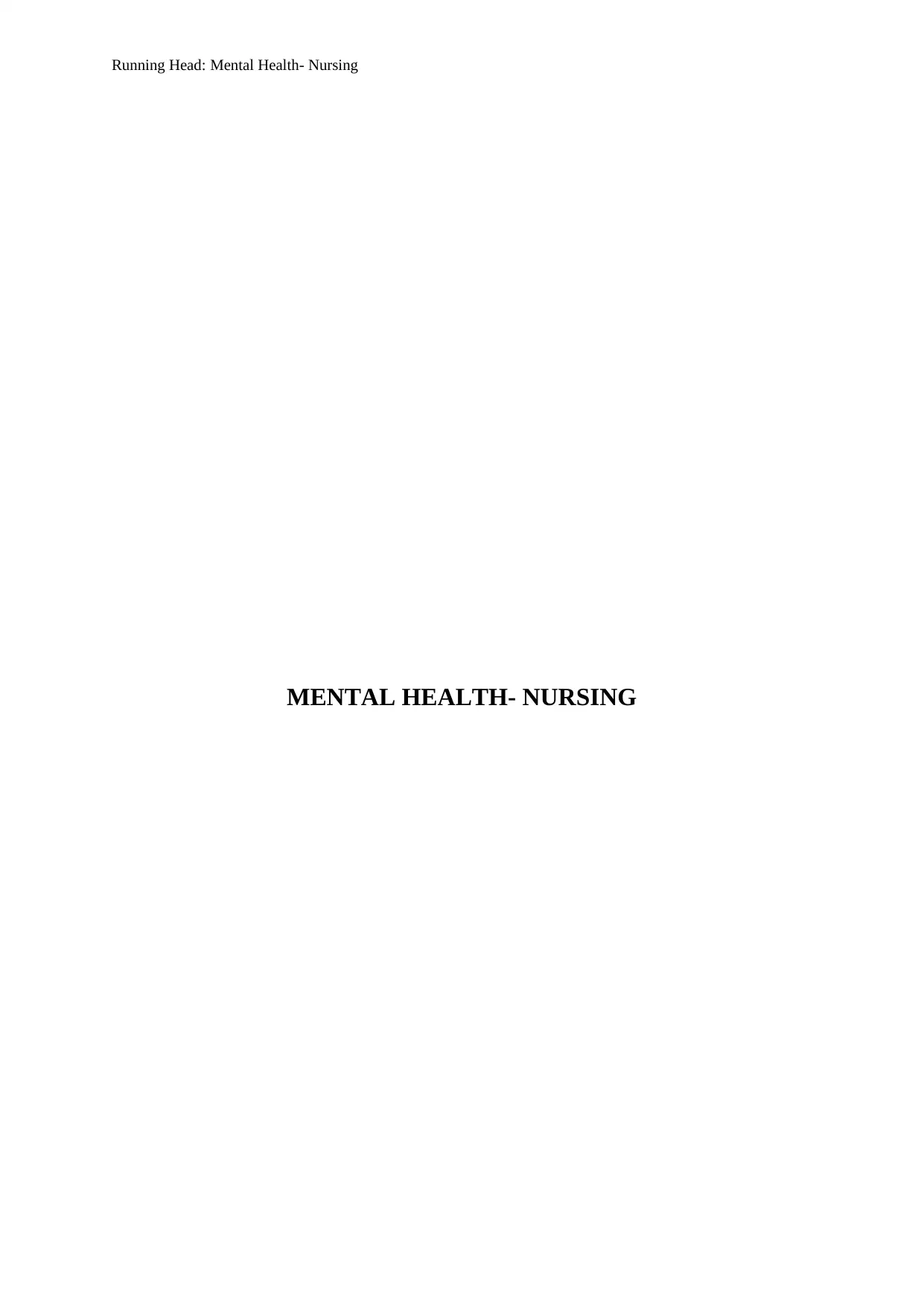
Running Head: Mental Health- Nursing
MENTAL HEALTH- NURSING
MENTAL HEALTH- NURSING
Secure Best Marks with AI Grader
Need help grading? Try our AI Grader for instant feedback on your assignments.
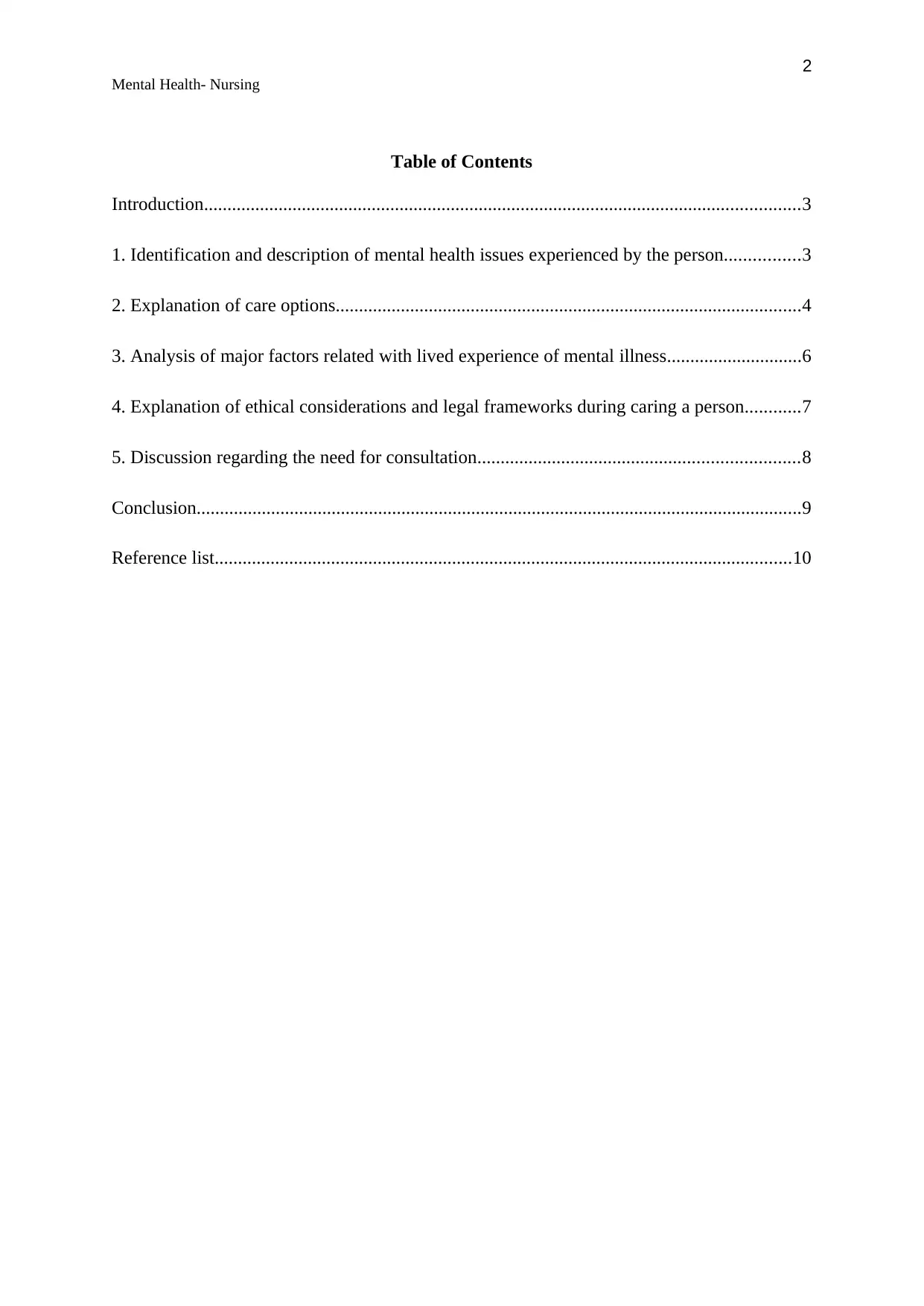
2
Mental Health- Nursing
Table of Contents
Introduction................................................................................................................................3
1. Identification and description of mental health issues experienced by the person................3
2. Explanation of care options....................................................................................................4
3. Analysis of major factors related with lived experience of mental illness.............................6
4. Explanation of ethical considerations and legal frameworks during caring a person............7
5. Discussion regarding the need for consultation.....................................................................8
Conclusion..................................................................................................................................9
Reference list............................................................................................................................10
Mental Health- Nursing
Table of Contents
Introduction................................................................................................................................3
1. Identification and description of mental health issues experienced by the person................3
2. Explanation of care options....................................................................................................4
3. Analysis of major factors related with lived experience of mental illness.............................6
4. Explanation of ethical considerations and legal frameworks during caring a person............7
5. Discussion regarding the need for consultation.....................................................................8
Conclusion..................................................................................................................................9
Reference list............................................................................................................................10
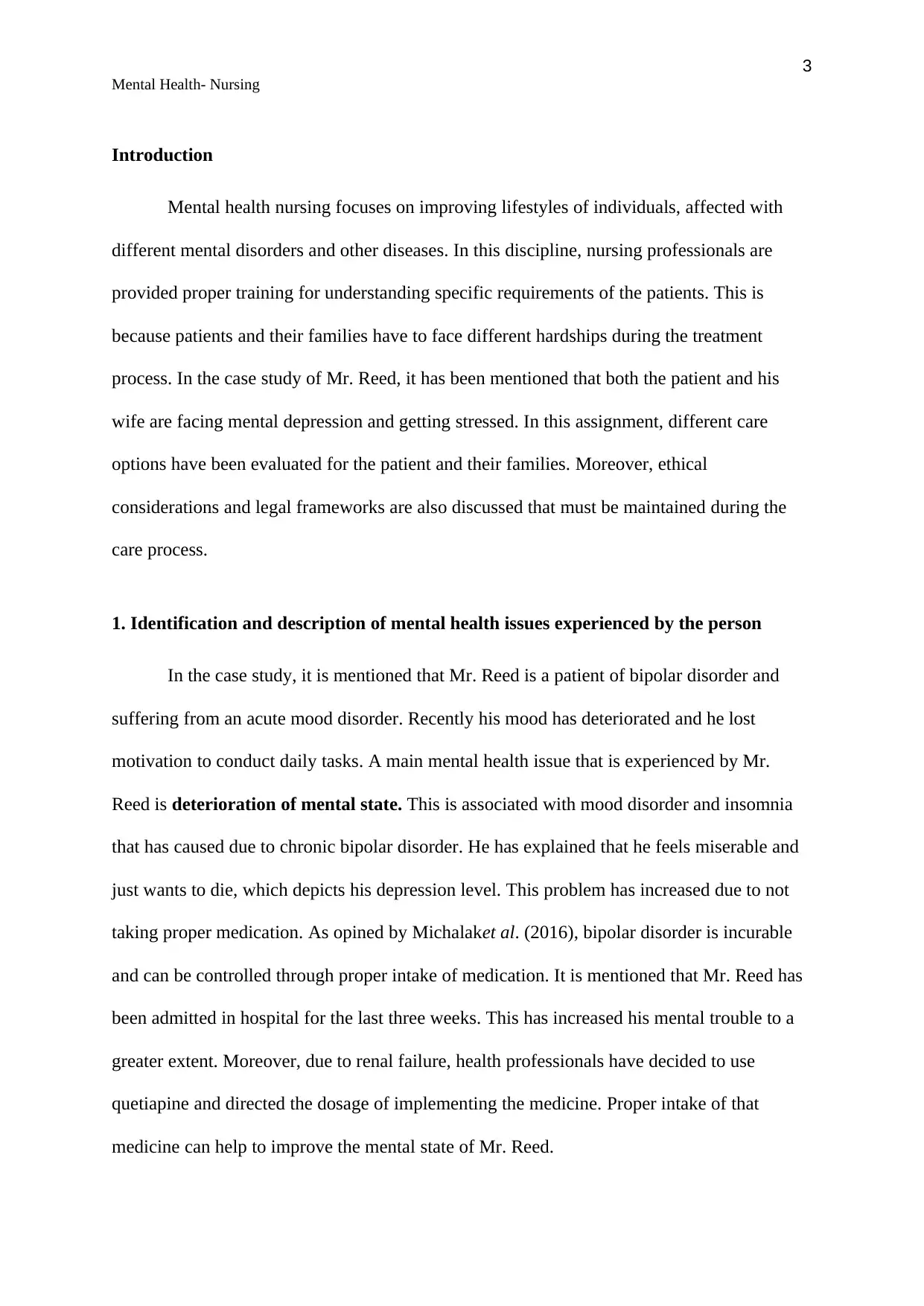
3
Mental Health- Nursing
Introduction
Mental health nursing focuses on improving lifestyles of individuals, affected with
different mental disorders and other diseases. In this discipline, nursing professionals are
provided proper training for understanding specific requirements of the patients. This is
because patients and their families have to face different hardships during the treatment
process. In the case study of Mr. Reed, it has been mentioned that both the patient and his
wife are facing mental depression and getting stressed. In this assignment, different care
options have been evaluated for the patient and their families. Moreover, ethical
considerations and legal frameworks are also discussed that must be maintained during the
care process.
1. Identification and description of mental health issues experienced by the person
In the case study, it is mentioned that Mr. Reed is a patient of bipolar disorder and
suffering from an acute mood disorder. Recently his mood has deteriorated and he lost
motivation to conduct daily tasks. A main mental health issue that is experienced by Mr.
Reed is deterioration of mental state. This is associated with mood disorder and insomnia
that has caused due to chronic bipolar disorder. He has explained that he feels miserable and
just wants to die, which depicts his depression level. This problem has increased due to not
taking proper medication. As opined by Michalaket al. (2016), bipolar disorder is incurable
and can be controlled through proper intake of medication. It is mentioned that Mr. Reed has
been admitted in hospital for the last three weeks. This has increased his mental trouble to a
greater extent. Moreover, due to renal failure, health professionals have decided to use
quetiapine and directed the dosage of implementing the medicine. Proper intake of that
medicine can help to improve the mental state of Mr. Reed.
Mental Health- Nursing
Introduction
Mental health nursing focuses on improving lifestyles of individuals, affected with
different mental disorders and other diseases. In this discipline, nursing professionals are
provided proper training for understanding specific requirements of the patients. This is
because patients and their families have to face different hardships during the treatment
process. In the case study of Mr. Reed, it has been mentioned that both the patient and his
wife are facing mental depression and getting stressed. In this assignment, different care
options have been evaluated for the patient and their families. Moreover, ethical
considerations and legal frameworks are also discussed that must be maintained during the
care process.
1. Identification and description of mental health issues experienced by the person
In the case study, it is mentioned that Mr. Reed is a patient of bipolar disorder and
suffering from an acute mood disorder. Recently his mood has deteriorated and he lost
motivation to conduct daily tasks. A main mental health issue that is experienced by Mr.
Reed is deterioration of mental state. This is associated with mood disorder and insomnia
that has caused due to chronic bipolar disorder. He has explained that he feels miserable and
just wants to die, which depicts his depression level. This problem has increased due to not
taking proper medication. As opined by Michalaket al. (2016), bipolar disorder is incurable
and can be controlled through proper intake of medication. It is mentioned that Mr. Reed has
been admitted in hospital for the last three weeks. This has increased his mental trouble to a
greater extent. Moreover, due to renal failure, health professionals have decided to use
quetiapine and directed the dosage of implementing the medicine. Proper intake of that
medicine can help to improve the mental state of Mr. Reed.
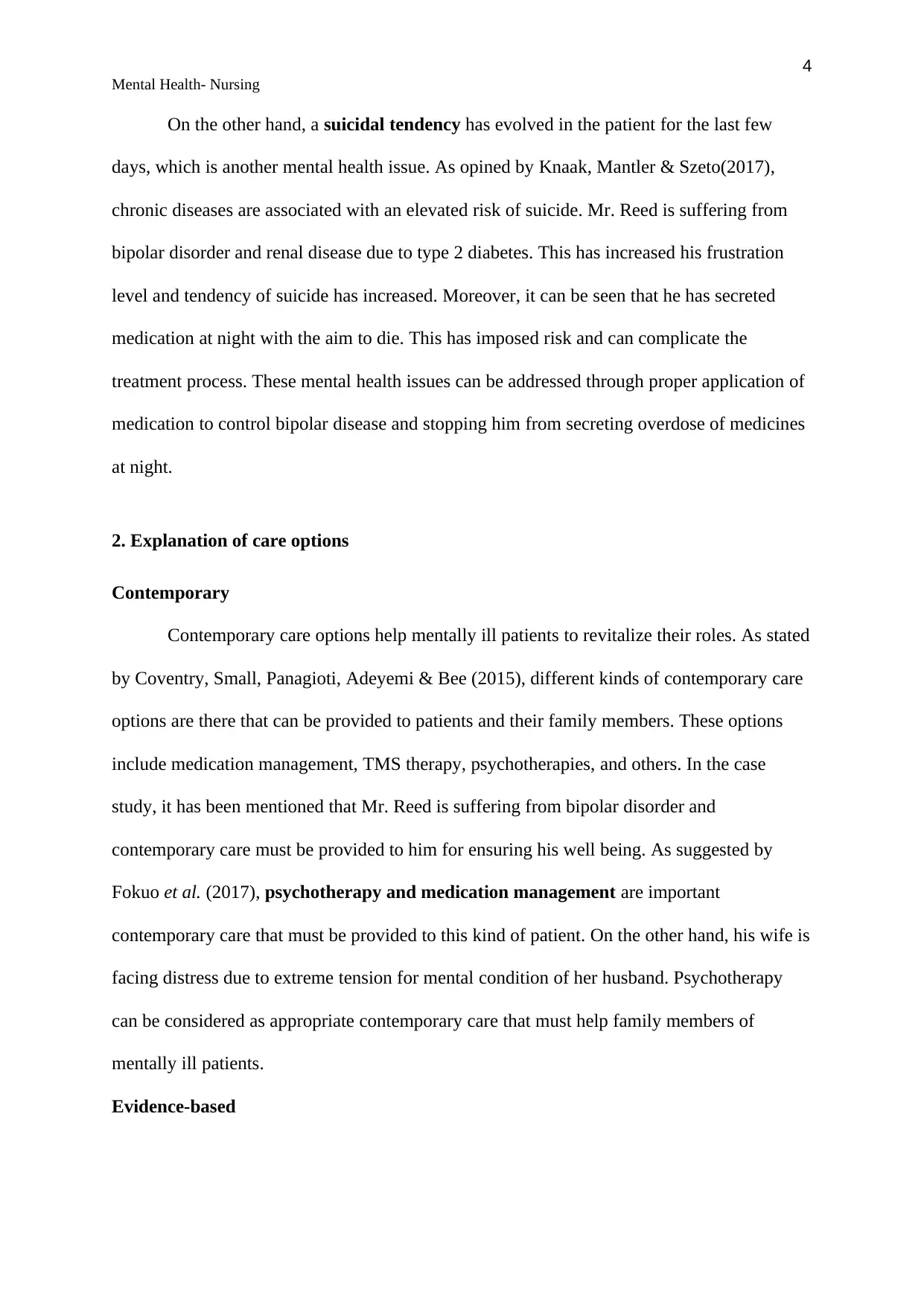
4
Mental Health- Nursing
On the other hand, a suicidal tendency has evolved in the patient for the last few
days, which is another mental health issue. As opined by Knaak, Mantler & Szeto(2017),
chronic diseases are associated with an elevated risk of suicide. Mr. Reed is suffering from
bipolar disorder and renal disease due to type 2 diabetes. This has increased his frustration
level and tendency of suicide has increased. Moreover, it can be seen that he has secreted
medication at night with the aim to die. This has imposed risk and can complicate the
treatment process. These mental health issues can be addressed through proper application of
medication to control bipolar disease and stopping him from secreting overdose of medicines
at night.
2. Explanation of care options
Contemporary
Contemporary care options help mentally ill patients to revitalize their roles. As stated
by Coventry, Small, Panagioti, Adeyemi & Bee (2015), different kinds of contemporary care
options are there that can be provided to patients and their family members. These options
include medication management, TMS therapy, psychotherapies, and others. In the case
study, it has been mentioned that Mr. Reed is suffering from bipolar disorder and
contemporary care must be provided to him for ensuring his well being. As suggested by
Fokuo et al. (2017), psychotherapy and medication management are important
contemporary care that must be provided to this kind of patient. On the other hand, his wife is
facing distress due to extreme tension for mental condition of her husband. Psychotherapy
can be considered as appropriate contemporary care that must help family members of
mentally ill patients.
Evidence-based
Mental Health- Nursing
On the other hand, a suicidal tendency has evolved in the patient for the last few
days, which is another mental health issue. As opined by Knaak, Mantler & Szeto(2017),
chronic diseases are associated with an elevated risk of suicide. Mr. Reed is suffering from
bipolar disorder and renal disease due to type 2 diabetes. This has increased his frustration
level and tendency of suicide has increased. Moreover, it can be seen that he has secreted
medication at night with the aim to die. This has imposed risk and can complicate the
treatment process. These mental health issues can be addressed through proper application of
medication to control bipolar disease and stopping him from secreting overdose of medicines
at night.
2. Explanation of care options
Contemporary
Contemporary care options help mentally ill patients to revitalize their roles. As stated
by Coventry, Small, Panagioti, Adeyemi & Bee (2015), different kinds of contemporary care
options are there that can be provided to patients and their family members. These options
include medication management, TMS therapy, psychotherapies, and others. In the case
study, it has been mentioned that Mr. Reed is suffering from bipolar disorder and
contemporary care must be provided to him for ensuring his well being. As suggested by
Fokuo et al. (2017), psychotherapy and medication management are important
contemporary care that must be provided to this kind of patient. On the other hand, his wife is
facing distress due to extreme tension for mental condition of her husband. Psychotherapy
can be considered as appropriate contemporary care that must help family members of
mentally ill patients.
Evidence-based
Secure Best Marks with AI Grader
Need help grading? Try our AI Grader for instant feedback on your assignments.
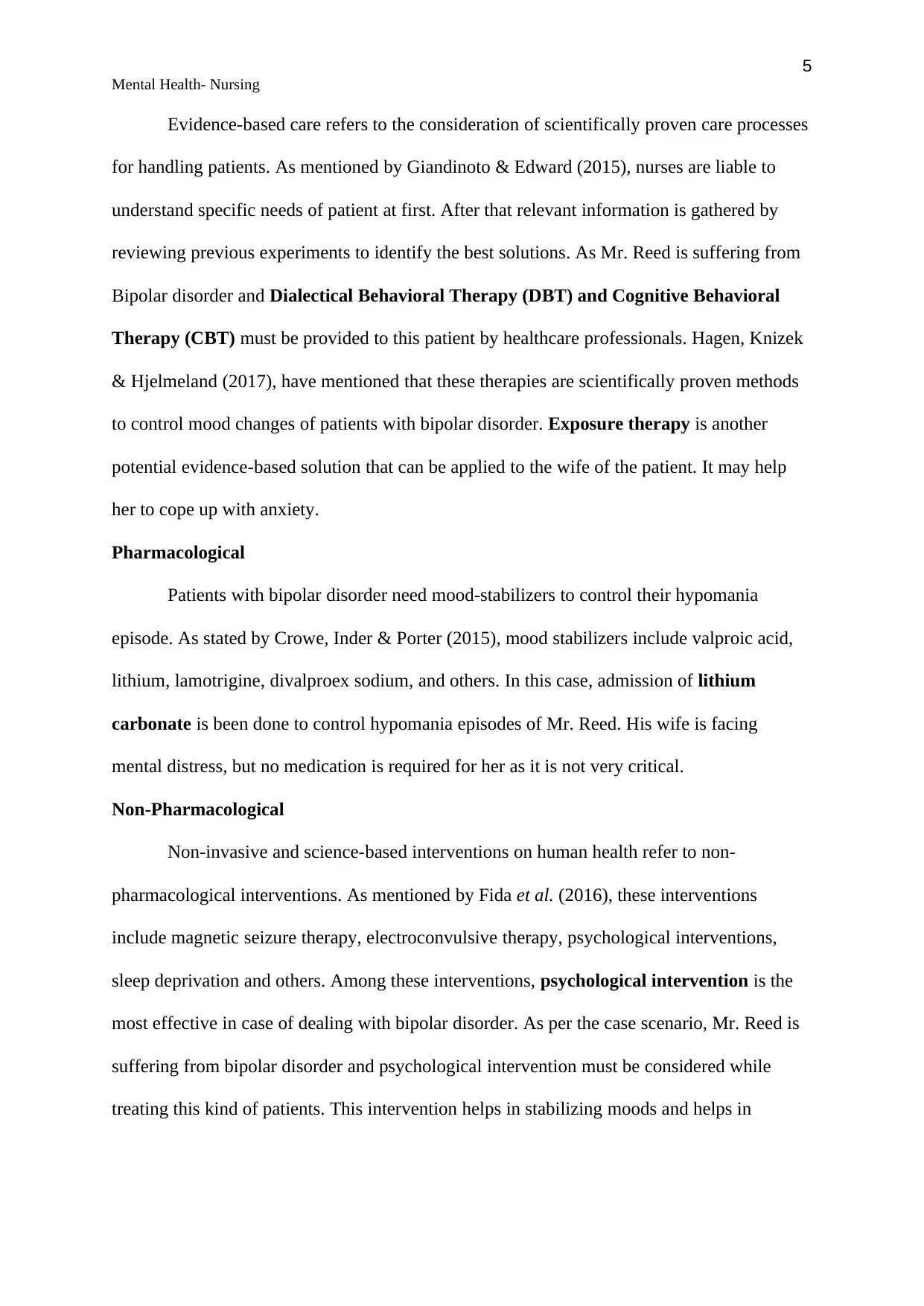
5
Mental Health- Nursing
Evidence-based care refers to the consideration of scientifically proven care processes
for handling patients. As mentioned by Giandinoto & Edward (2015), nurses are liable to
understand specific needs of patient at first. After that relevant information is gathered by
reviewing previous experiments to identify the best solutions. As Mr. Reed is suffering from
Bipolar disorder and Dialectical Behavioral Therapy (DBT) and Cognitive Behavioral
Therapy (CBT) must be provided to this patient by healthcare professionals. Hagen, Knizek
& Hjelmeland (2017), have mentioned that these therapies are scientifically proven methods
to control mood changes of patients with bipolar disorder. Exposure therapy is another
potential evidence-based solution that can be applied to the wife of the patient. It may help
her to cope up with anxiety.
Pharmacological
Patients with bipolar disorder need mood-stabilizers to control their hypomania
episode. As stated by Crowe, Inder & Porter (2015), mood stabilizers include valproic acid,
lithium, lamotrigine, divalproex sodium, and others. In this case, admission of lithium
carbonate is been done to control hypomania episodes of Mr. Reed. His wife is facing
mental distress, but no medication is required for her as it is not very critical.
Non-Pharmacological
Non-invasive and science-based interventions on human health refer to non-
pharmacological interventions. As mentioned by Fida et al. (2016), these interventions
include magnetic seizure therapy, electroconvulsive therapy, psychological interventions,
sleep deprivation and others. Among these interventions, psychological intervention is the
most effective in case of dealing with bipolar disorder. As per the case scenario, Mr. Reed is
suffering from bipolar disorder and psychological intervention must be considered while
treating this kind of patients. This intervention helps in stabilizing moods and helps in
Mental Health- Nursing
Evidence-based care refers to the consideration of scientifically proven care processes
for handling patients. As mentioned by Giandinoto & Edward (2015), nurses are liable to
understand specific needs of patient at first. After that relevant information is gathered by
reviewing previous experiments to identify the best solutions. As Mr. Reed is suffering from
Bipolar disorder and Dialectical Behavioral Therapy (DBT) and Cognitive Behavioral
Therapy (CBT) must be provided to this patient by healthcare professionals. Hagen, Knizek
& Hjelmeland (2017), have mentioned that these therapies are scientifically proven methods
to control mood changes of patients with bipolar disorder. Exposure therapy is another
potential evidence-based solution that can be applied to the wife of the patient. It may help
her to cope up with anxiety.
Pharmacological
Patients with bipolar disorder need mood-stabilizers to control their hypomania
episode. As stated by Crowe, Inder & Porter (2015), mood stabilizers include valproic acid,
lithium, lamotrigine, divalproex sodium, and others. In this case, admission of lithium
carbonate is been done to control hypomania episodes of Mr. Reed. His wife is facing
mental distress, but no medication is required for her as it is not very critical.
Non-Pharmacological
Non-invasive and science-based interventions on human health refer to non-
pharmacological interventions. As mentioned by Fida et al. (2016), these interventions
include magnetic seizure therapy, electroconvulsive therapy, psychological interventions,
sleep deprivation and others. Among these interventions, psychological intervention is the
most effective in case of dealing with bipolar disorder. As per the case scenario, Mr. Reed is
suffering from bipolar disorder and psychological intervention must be considered while
treating this kind of patients. This intervention helps in stabilizing moods and helps in
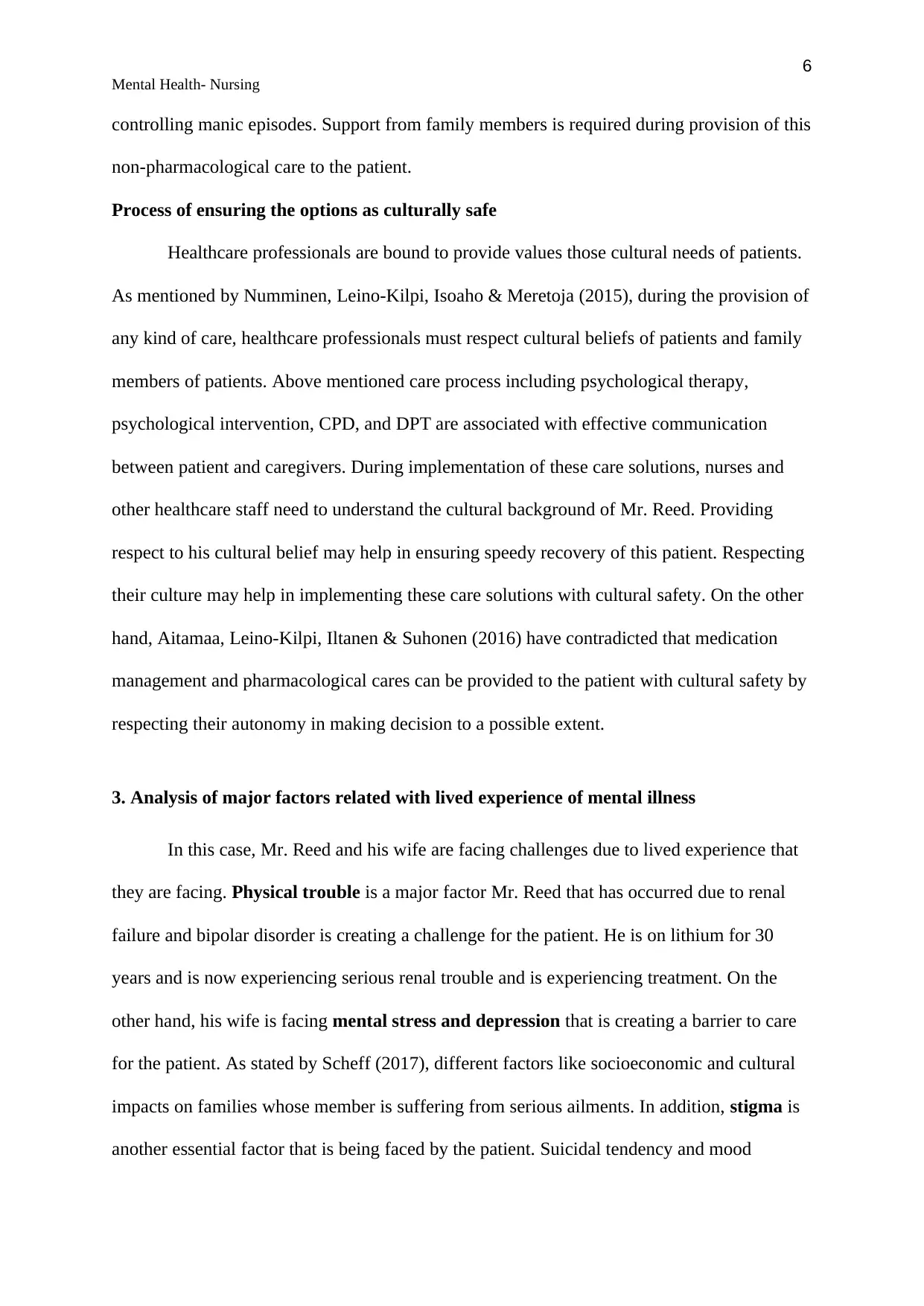
6
Mental Health- Nursing
controlling manic episodes. Support from family members is required during provision of this
non-pharmacological care to the patient.
Process of ensuring the options as culturally safe
Healthcare professionals are bound to provide values those cultural needs of patients.
As mentioned by Numminen, Leino-Kilpi, Isoaho & Meretoja (2015), during the provision of
any kind of care, healthcare professionals must respect cultural beliefs of patients and family
members of patients. Above mentioned care process including psychological therapy,
psychological intervention, CPD, and DPT are associated with effective communication
between patient and caregivers. During implementation of these care solutions, nurses and
other healthcare staff need to understand the cultural background of Mr. Reed. Providing
respect to his cultural belief may help in ensuring speedy recovery of this patient. Respecting
their culture may help in implementing these care solutions with cultural safety. On the other
hand, Aitamaa, Leino-Kilpi, Iltanen & Suhonen (2016) have contradicted that medication
management and pharmacological cares can be provided to the patient with cultural safety by
respecting their autonomy in making decision to a possible extent.
3. Analysis of major factors related with lived experience of mental illness
In this case, Mr. Reed and his wife are facing challenges due to lived experience that
they are facing. Physical trouble is a major factor Mr. Reed that has occurred due to renal
failure and bipolar disorder is creating a challenge for the patient. He is on lithium for 30
years and is now experiencing serious renal trouble and is experiencing treatment. On the
other hand, his wife is facing mental stress and depression that is creating a barrier to care
for the patient. As stated by Scheff (2017), different factors like socioeconomic and cultural
impacts on families whose member is suffering from serious ailments. In addition, stigma is
another essential factor that is being faced by the patient. Suicidal tendency and mood
Mental Health- Nursing
controlling manic episodes. Support from family members is required during provision of this
non-pharmacological care to the patient.
Process of ensuring the options as culturally safe
Healthcare professionals are bound to provide values those cultural needs of patients.
As mentioned by Numminen, Leino-Kilpi, Isoaho & Meretoja (2015), during the provision of
any kind of care, healthcare professionals must respect cultural beliefs of patients and family
members of patients. Above mentioned care process including psychological therapy,
psychological intervention, CPD, and DPT are associated with effective communication
between patient and caregivers. During implementation of these care solutions, nurses and
other healthcare staff need to understand the cultural background of Mr. Reed. Providing
respect to his cultural belief may help in ensuring speedy recovery of this patient. Respecting
their culture may help in implementing these care solutions with cultural safety. On the other
hand, Aitamaa, Leino-Kilpi, Iltanen & Suhonen (2016) have contradicted that medication
management and pharmacological cares can be provided to the patient with cultural safety by
respecting their autonomy in making decision to a possible extent.
3. Analysis of major factors related with lived experience of mental illness
In this case, Mr. Reed and his wife are facing challenges due to lived experience that
they are facing. Physical trouble is a major factor Mr. Reed that has occurred due to renal
failure and bipolar disorder is creating a challenge for the patient. He is on lithium for 30
years and is now experiencing serious renal trouble and is experiencing treatment. On the
other hand, his wife is facing mental stress and depression that is creating a barrier to care
for the patient. As stated by Scheff (2017), different factors like socioeconomic and cultural
impacts on families whose member is suffering from serious ailments. In addition, stigma is
another essential factor that is being faced by the patient. Suicidal tendency and mood
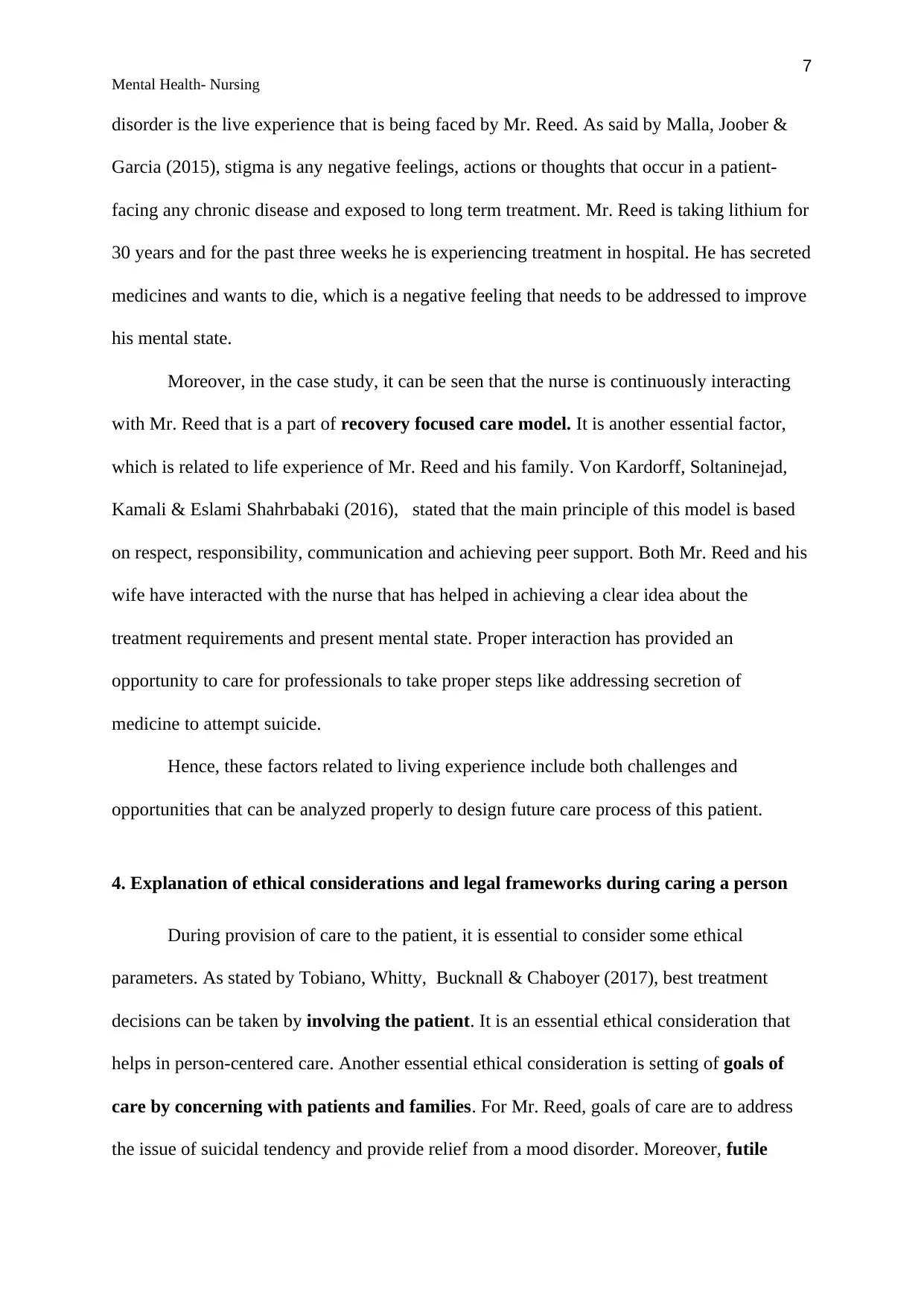
7
Mental Health- Nursing
disorder is the live experience that is being faced by Mr. Reed. As said by Malla, Joober &
Garcia (2015), stigma is any negative feelings, actions or thoughts that occur in a patient-
facing any chronic disease and exposed to long term treatment. Mr. Reed is taking lithium for
30 years and for the past three weeks he is experiencing treatment in hospital. He has secreted
medicines and wants to die, which is a negative feeling that needs to be addressed to improve
his mental state.
Moreover, in the case study, it can be seen that the nurse is continuously interacting
with Mr. Reed that is a part of recovery focused care model. It is another essential factor,
which is related to life experience of Mr. Reed and his family. Von Kardorff, Soltaninejad,
Kamali & Eslami Shahrbabaki (2016), stated that the main principle of this model is based
on respect, responsibility, communication and achieving peer support. Both Mr. Reed and his
wife have interacted with the nurse that has helped in achieving a clear idea about the
treatment requirements and present mental state. Proper interaction has provided an
opportunity to care for professionals to take proper steps like addressing secretion of
medicine to attempt suicide.
Hence, these factors related to living experience include both challenges and
opportunities that can be analyzed properly to design future care process of this patient.
4. Explanation of ethical considerations and legal frameworks during caring a person
During provision of care to the patient, it is essential to consider some ethical
parameters. As stated by Tobiano, Whitty, Bucknall & Chaboyer (2017), best treatment
decisions can be taken by involving the patient. It is an essential ethical consideration that
helps in person-centered care. Another essential ethical consideration is setting of goals of
care by concerning with patients and families. For Mr. Reed, goals of care are to address
the issue of suicidal tendency and provide relief from a mood disorder. Moreover, futile
Mental Health- Nursing
disorder is the live experience that is being faced by Mr. Reed. As said by Malla, Joober &
Garcia (2015), stigma is any negative feelings, actions or thoughts that occur in a patient-
facing any chronic disease and exposed to long term treatment. Mr. Reed is taking lithium for
30 years and for the past three weeks he is experiencing treatment in hospital. He has secreted
medicines and wants to die, which is a negative feeling that needs to be addressed to improve
his mental state.
Moreover, in the case study, it can be seen that the nurse is continuously interacting
with Mr. Reed that is a part of recovery focused care model. It is another essential factor,
which is related to life experience of Mr. Reed and his family. Von Kardorff, Soltaninejad,
Kamali & Eslami Shahrbabaki (2016), stated that the main principle of this model is based
on respect, responsibility, communication and achieving peer support. Both Mr. Reed and his
wife have interacted with the nurse that has helped in achieving a clear idea about the
treatment requirements and present mental state. Proper interaction has provided an
opportunity to care for professionals to take proper steps like addressing secretion of
medicine to attempt suicide.
Hence, these factors related to living experience include both challenges and
opportunities that can be analyzed properly to design future care process of this patient.
4. Explanation of ethical considerations and legal frameworks during caring a person
During provision of care to the patient, it is essential to consider some ethical
parameters. As stated by Tobiano, Whitty, Bucknall & Chaboyer (2017), best treatment
decisions can be taken by involving the patient. It is an essential ethical consideration that
helps in person-centered care. Another essential ethical consideration is setting of goals of
care by concerning with patients and families. For Mr. Reed, goals of care are to address
the issue of suicidal tendency and provide relief from a mood disorder. Moreover, futile
Paraphrase This Document
Need a fresh take? Get an instant paraphrase of this document with our AI Paraphraser
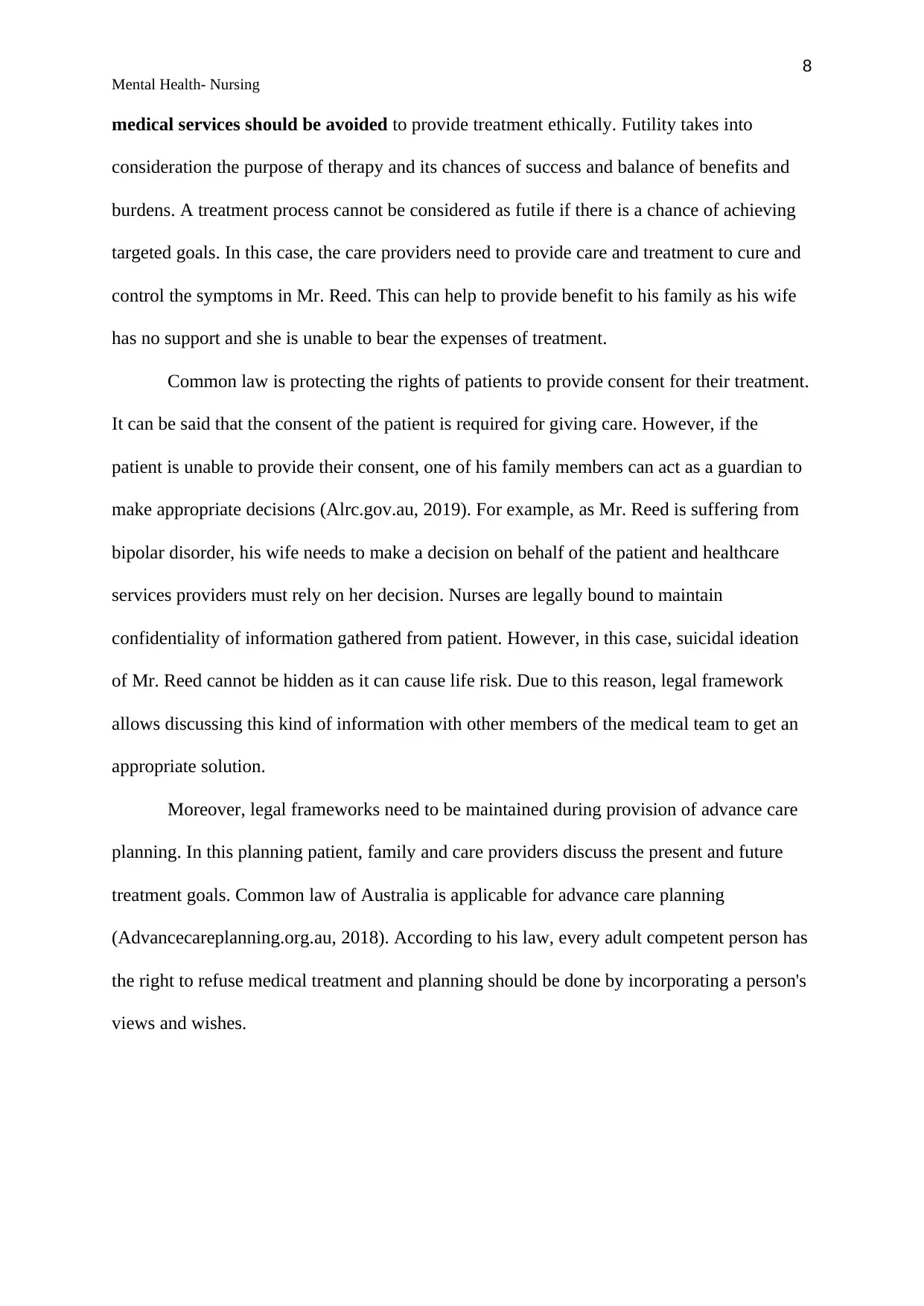
8
Mental Health- Nursing
medical services should be avoided to provide treatment ethically. Futility takes into
consideration the purpose of therapy and its chances of success and balance of benefits and
burdens. A treatment process cannot be considered as futile if there is a chance of achieving
targeted goals. In this case, the care providers need to provide care and treatment to cure and
control the symptoms in Mr. Reed. This can help to provide benefit to his family as his wife
has no support and she is unable to bear the expenses of treatment.
Common law is protecting the rights of patients to provide consent for their treatment.
It can be said that the consent of the patient is required for giving care. However, if the
patient is unable to provide their consent, one of his family members can act as a guardian to
make appropriate decisions (Alrc.gov.au, 2019). For example, as Mr. Reed is suffering from
bipolar disorder, his wife needs to make a decision on behalf of the patient and healthcare
services providers must rely on her decision. Nurses are legally bound to maintain
confidentiality of information gathered from patient. However, in this case, suicidal ideation
of Mr. Reed cannot be hidden as it can cause life risk. Due to this reason, legal framework
allows discussing this kind of information with other members of the medical team to get an
appropriate solution.
Moreover, legal frameworks need to be maintained during provision of advance care
planning. In this planning patient, family and care providers discuss the present and future
treatment goals. Common law of Australia is applicable for advance care planning
(Advancecareplanning.org.au, 2018). According to his law, every adult competent person has
the right to refuse medical treatment and planning should be done by incorporating a person's
views and wishes.
Mental Health- Nursing
medical services should be avoided to provide treatment ethically. Futility takes into
consideration the purpose of therapy and its chances of success and balance of benefits and
burdens. A treatment process cannot be considered as futile if there is a chance of achieving
targeted goals. In this case, the care providers need to provide care and treatment to cure and
control the symptoms in Mr. Reed. This can help to provide benefit to his family as his wife
has no support and she is unable to bear the expenses of treatment.
Common law is protecting the rights of patients to provide consent for their treatment.
It can be said that the consent of the patient is required for giving care. However, if the
patient is unable to provide their consent, one of his family members can act as a guardian to
make appropriate decisions (Alrc.gov.au, 2019). For example, as Mr. Reed is suffering from
bipolar disorder, his wife needs to make a decision on behalf of the patient and healthcare
services providers must rely on her decision. Nurses are legally bound to maintain
confidentiality of information gathered from patient. However, in this case, suicidal ideation
of Mr. Reed cannot be hidden as it can cause life risk. Due to this reason, legal framework
allows discussing this kind of information with other members of the medical team to get an
appropriate solution.
Moreover, legal frameworks need to be maintained during provision of advance care
planning. In this planning patient, family and care providers discuss the present and future
treatment goals. Common law of Australia is applicable for advance care planning
(Advancecareplanning.org.au, 2018). According to his law, every adult competent person has
the right to refuse medical treatment and planning should be done by incorporating a person's
views and wishes.
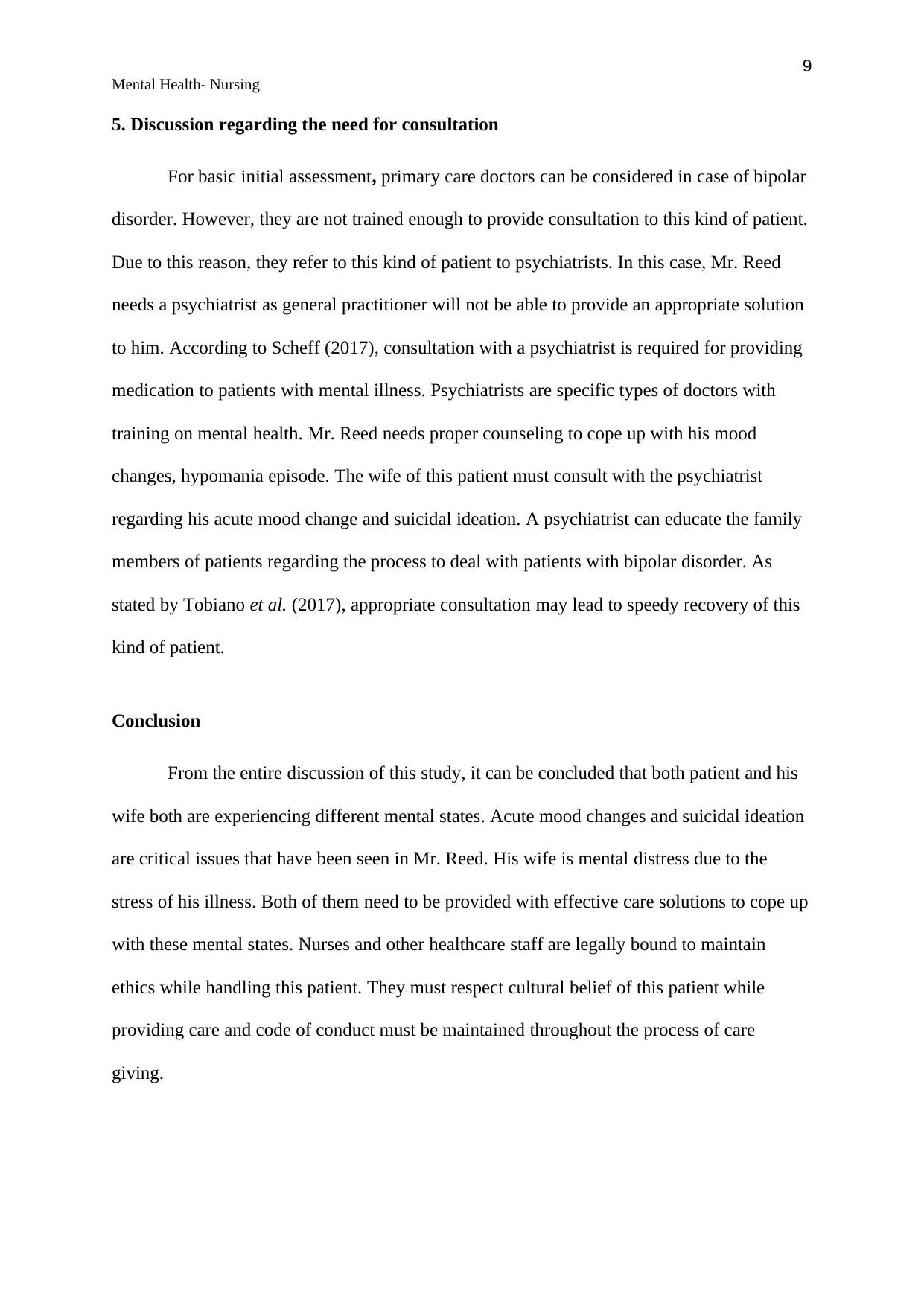
9
Mental Health- Nursing
5. Discussion regarding the need for consultation
For basic initial assessment, primary care doctors can be considered in case of bipolar
disorder. However, they are not trained enough to provide consultation to this kind of patient.
Due to this reason, they refer to this kind of patient to psychiatrists. In this case, Mr. Reed
needs a psychiatrist as general practitioner will not be able to provide an appropriate solution
to him. According to Scheff (2017), consultation with a psychiatrist is required for providing
medication to patients with mental illness. Psychiatrists are specific types of doctors with
training on mental health. Mr. Reed needs proper counseling to cope up with his mood
changes, hypomania episode. The wife of this patient must consult with the psychiatrist
regarding his acute mood change and suicidal ideation. A psychiatrist can educate the family
members of patients regarding the process to deal with patients with bipolar disorder. As
stated by Tobiano et al. (2017), appropriate consultation may lead to speedy recovery of this
kind of patient.
Conclusion
From the entire discussion of this study, it can be concluded that both patient and his
wife both are experiencing different mental states. Acute mood changes and suicidal ideation
are critical issues that have been seen in Mr. Reed. His wife is mental distress due to the
stress of his illness. Both of them need to be provided with effective care solutions to cope up
with these mental states. Nurses and other healthcare staff are legally bound to maintain
ethics while handling this patient. They must respect cultural belief of this patient while
providing care and code of conduct must be maintained throughout the process of care
giving.
Mental Health- Nursing
5. Discussion regarding the need for consultation
For basic initial assessment, primary care doctors can be considered in case of bipolar
disorder. However, they are not trained enough to provide consultation to this kind of patient.
Due to this reason, they refer to this kind of patient to psychiatrists. In this case, Mr. Reed
needs a psychiatrist as general practitioner will not be able to provide an appropriate solution
to him. According to Scheff (2017), consultation with a psychiatrist is required for providing
medication to patients with mental illness. Psychiatrists are specific types of doctors with
training on mental health. Mr. Reed needs proper counseling to cope up with his mood
changes, hypomania episode. The wife of this patient must consult with the psychiatrist
regarding his acute mood change and suicidal ideation. A psychiatrist can educate the family
members of patients regarding the process to deal with patients with bipolar disorder. As
stated by Tobiano et al. (2017), appropriate consultation may lead to speedy recovery of this
kind of patient.
Conclusion
From the entire discussion of this study, it can be concluded that both patient and his
wife both are experiencing different mental states. Acute mood changes and suicidal ideation
are critical issues that have been seen in Mr. Reed. His wife is mental distress due to the
stress of his illness. Both of them need to be provided with effective care solutions to cope up
with these mental states. Nurses and other healthcare staff are legally bound to maintain
ethics while handling this patient. They must respect cultural belief of this patient while
providing care and code of conduct must be maintained throughout the process of care
giving.
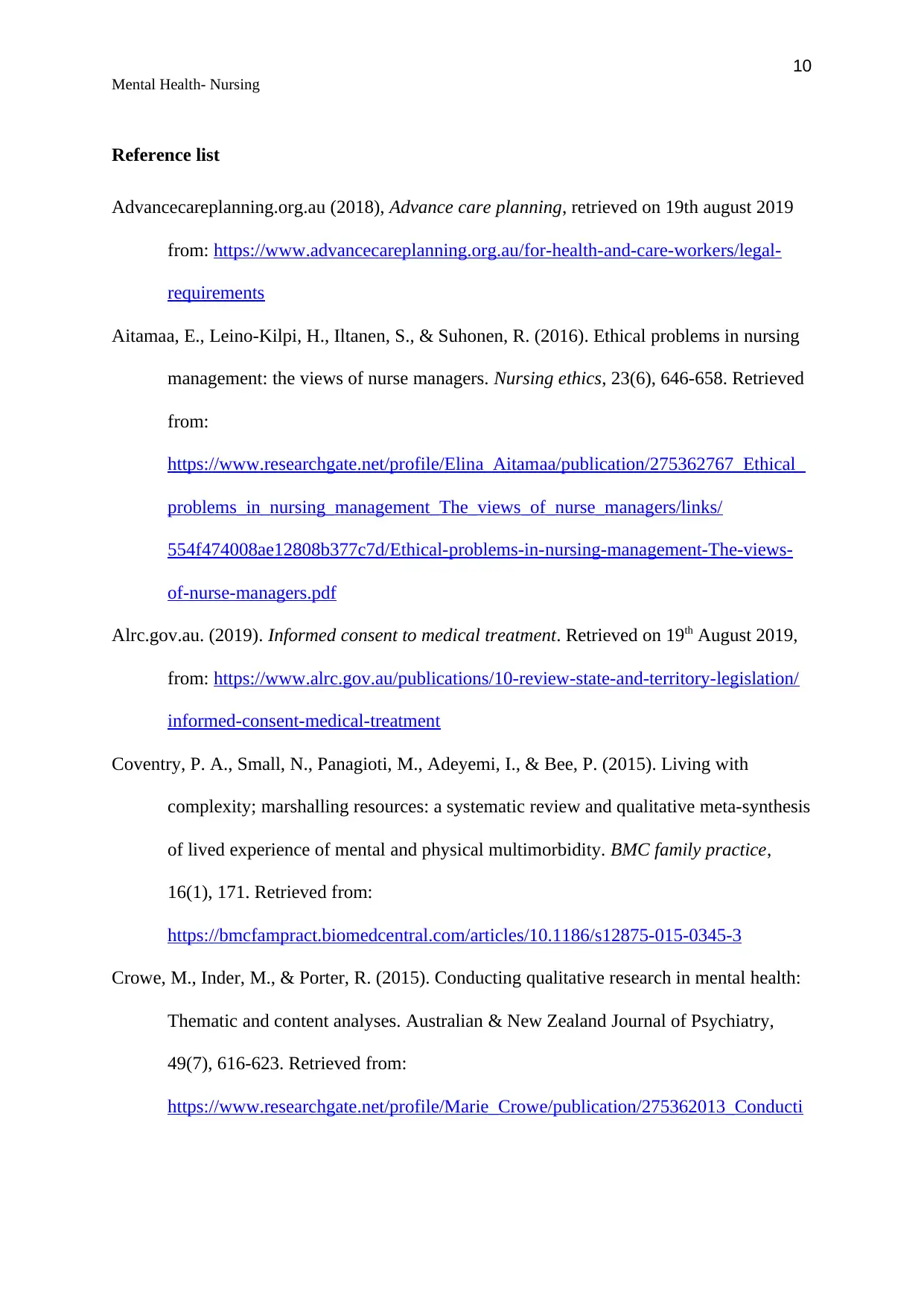
10
Mental Health- Nursing
Reference list
Advancecareplanning.org.au (2018), Advance care planning, retrieved on 19th august 2019
from: https://www.advancecareplanning.org.au/for-health-and-care-workers/legal-
requirements
Aitamaa, E., Leino-Kilpi, H., Iltanen, S., & Suhonen, R. (2016). Ethical problems in nursing
management: the views of nurse managers. Nursing ethics, 23(6), 646-658. Retrieved
from:
https://www.researchgate.net/profile/Elina_Aitamaa/publication/275362767_Ethical_
problems_in_nursing_management_The_views_of_nurse_managers/links/
554f474008ae12808b377c7d/Ethical-problems-in-nursing-management-The-views-
of-nurse-managers.pdf
Alrc.gov.au. (2019). Informed consent to medical treatment. Retrieved on 19th August 2019,
from: https://www.alrc.gov.au/publications/10-review-state-and-territory-legislation/
informed-consent-medical-treatment
Coventry, P. A., Small, N., Panagioti, M., Adeyemi, I., & Bee, P. (2015). Living with
complexity; marshalling resources: a systematic review and qualitative meta-synthesis
of lived experience of mental and physical multimorbidity. BMC family practice,
16(1), 171. Retrieved from:
https://bmcfampract.biomedcentral.com/articles/10.1186/s12875-015-0345-3
Crowe, M., Inder, M., & Porter, R. (2015). Conducting qualitative research in mental health:
Thematic and content analyses. Australian & New Zealand Journal of Psychiatry,
49(7), 616-623. Retrieved from:
https://www.researchgate.net/profile/Marie_Crowe/publication/275362013_Conducti
Mental Health- Nursing
Reference list
Advancecareplanning.org.au (2018), Advance care planning, retrieved on 19th august 2019
from: https://www.advancecareplanning.org.au/for-health-and-care-workers/legal-
requirements
Aitamaa, E., Leino-Kilpi, H., Iltanen, S., & Suhonen, R. (2016). Ethical problems in nursing
management: the views of nurse managers. Nursing ethics, 23(6), 646-658. Retrieved
from:
https://www.researchgate.net/profile/Elina_Aitamaa/publication/275362767_Ethical_
problems_in_nursing_management_The_views_of_nurse_managers/links/
554f474008ae12808b377c7d/Ethical-problems-in-nursing-management-The-views-
of-nurse-managers.pdf
Alrc.gov.au. (2019). Informed consent to medical treatment. Retrieved on 19th August 2019,
from: https://www.alrc.gov.au/publications/10-review-state-and-territory-legislation/
informed-consent-medical-treatment
Coventry, P. A., Small, N., Panagioti, M., Adeyemi, I., & Bee, P. (2015). Living with
complexity; marshalling resources: a systematic review and qualitative meta-synthesis
of lived experience of mental and physical multimorbidity. BMC family practice,
16(1), 171. Retrieved from:
https://bmcfampract.biomedcentral.com/articles/10.1186/s12875-015-0345-3
Crowe, M., Inder, M., & Porter, R. (2015). Conducting qualitative research in mental health:
Thematic and content analyses. Australian & New Zealand Journal of Psychiatry,
49(7), 616-623. Retrieved from:
https://www.researchgate.net/profile/Marie_Crowe/publication/275362013_Conducti
Secure Best Marks with AI Grader
Need help grading? Try our AI Grader for instant feedback on your assignments.
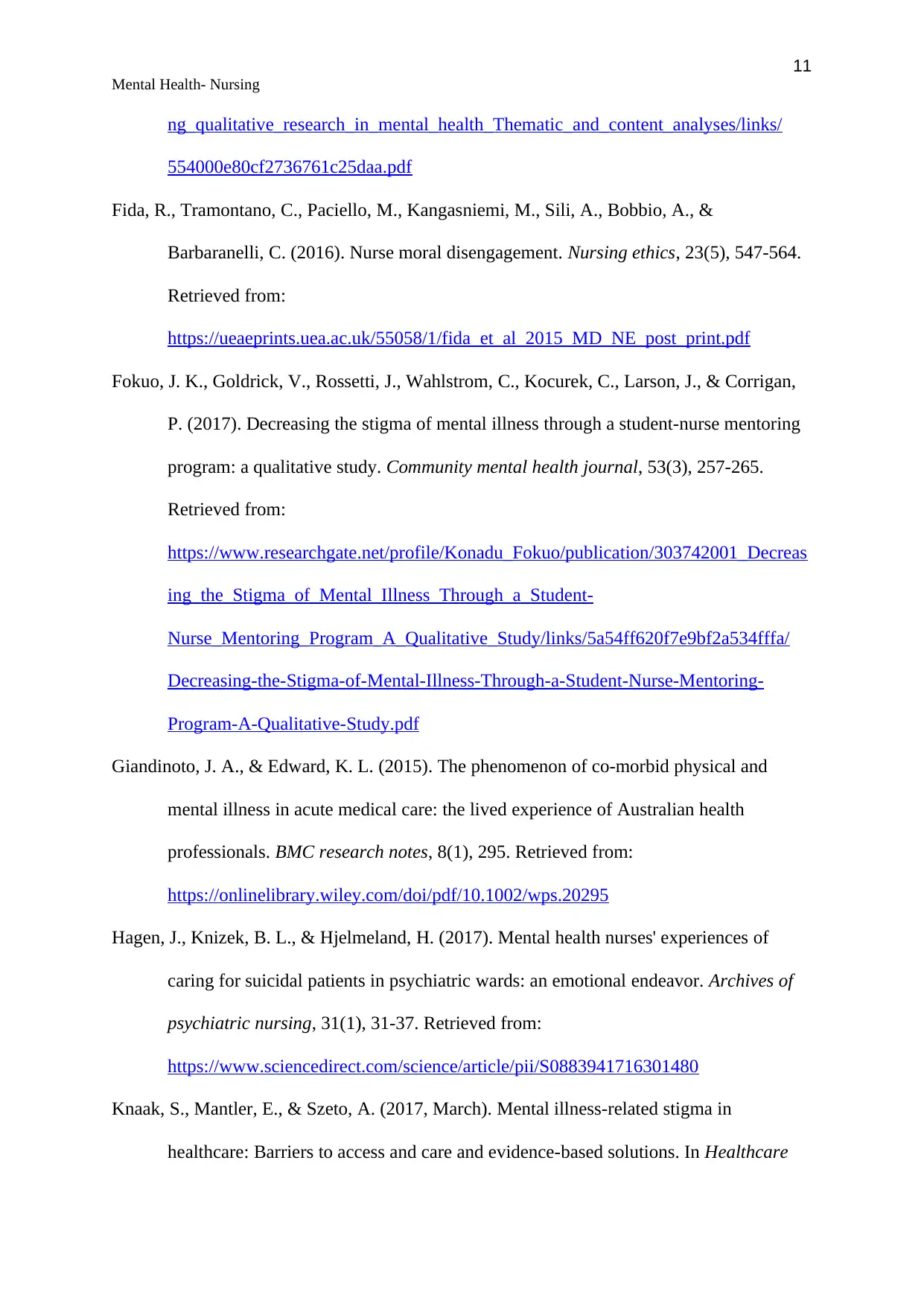
11
Mental Health- Nursing
ng_qualitative_research_in_mental_health_Thematic_and_content_analyses/links/
554000e80cf2736761c25daa.pdf
Fida, R., Tramontano, C., Paciello, M., Kangasniemi, M., Sili, A., Bobbio, A., &
Barbaranelli, C. (2016). Nurse moral disengagement. Nursing ethics, 23(5), 547-564.
Retrieved from:
https://ueaeprints.uea.ac.uk/55058/1/fida_et_al_2015_MD_NE_post_print.pdf
Fokuo, J. K., Goldrick, V., Rossetti, J., Wahlstrom, C., Kocurek, C., Larson, J., & Corrigan,
P. (2017). Decreasing the stigma of mental illness through a student-nurse mentoring
program: a qualitative study. Community mental health journal, 53(3), 257-265.
Retrieved from:
https://www.researchgate.net/profile/Konadu_Fokuo/publication/303742001_Decreas
ing_the_Stigma_of_Mental_Illness_Through_a_Student-
Nurse_Mentoring_Program_A_Qualitative_Study/links/5a54ff620f7e9bf2a534fffa/
Decreasing-the-Stigma-of-Mental-Illness-Through-a-Student-Nurse-Mentoring-
Program-A-Qualitative-Study.pdf
Giandinoto, J. A., & Edward, K. L. (2015). The phenomenon of co-morbid physical and
mental illness in acute medical care: the lived experience of Australian health
professionals. BMC research notes, 8(1), 295. Retrieved from:
https://onlinelibrary.wiley.com/doi/pdf/10.1002/wps.20295
Hagen, J., Knizek, B. L., & Hjelmeland, H. (2017). Mental health nurses' experiences of
caring for suicidal patients in psychiatric wards: an emotional endeavor. Archives of
psychiatric nursing, 31(1), 31-37. Retrieved from:
https://www.sciencedirect.com/science/article/pii/S0883941716301480
Knaak, S., Mantler, E., & Szeto, A. (2017, March). Mental illness-related stigma in
healthcare: Barriers to access and care and evidence-based solutions. In Healthcare
Mental Health- Nursing
ng_qualitative_research_in_mental_health_Thematic_and_content_analyses/links/
554000e80cf2736761c25daa.pdf
Fida, R., Tramontano, C., Paciello, M., Kangasniemi, M., Sili, A., Bobbio, A., &
Barbaranelli, C. (2016). Nurse moral disengagement. Nursing ethics, 23(5), 547-564.
Retrieved from:
https://ueaeprints.uea.ac.uk/55058/1/fida_et_al_2015_MD_NE_post_print.pdf
Fokuo, J. K., Goldrick, V., Rossetti, J., Wahlstrom, C., Kocurek, C., Larson, J., & Corrigan,
P. (2017). Decreasing the stigma of mental illness through a student-nurse mentoring
program: a qualitative study. Community mental health journal, 53(3), 257-265.
Retrieved from:
https://www.researchgate.net/profile/Konadu_Fokuo/publication/303742001_Decreas
ing_the_Stigma_of_Mental_Illness_Through_a_Student-
Nurse_Mentoring_Program_A_Qualitative_Study/links/5a54ff620f7e9bf2a534fffa/
Decreasing-the-Stigma-of-Mental-Illness-Through-a-Student-Nurse-Mentoring-
Program-A-Qualitative-Study.pdf
Giandinoto, J. A., & Edward, K. L. (2015). The phenomenon of co-morbid physical and
mental illness in acute medical care: the lived experience of Australian health
professionals. BMC research notes, 8(1), 295. Retrieved from:
https://onlinelibrary.wiley.com/doi/pdf/10.1002/wps.20295
Hagen, J., Knizek, B. L., & Hjelmeland, H. (2017). Mental health nurses' experiences of
caring for suicidal patients in psychiatric wards: an emotional endeavor. Archives of
psychiatric nursing, 31(1), 31-37. Retrieved from:
https://www.sciencedirect.com/science/article/pii/S0883941716301480
Knaak, S., Mantler, E., & Szeto, A. (2017, March). Mental illness-related stigma in
healthcare: Barriers to access and care and evidence-based solutions. In Healthcare
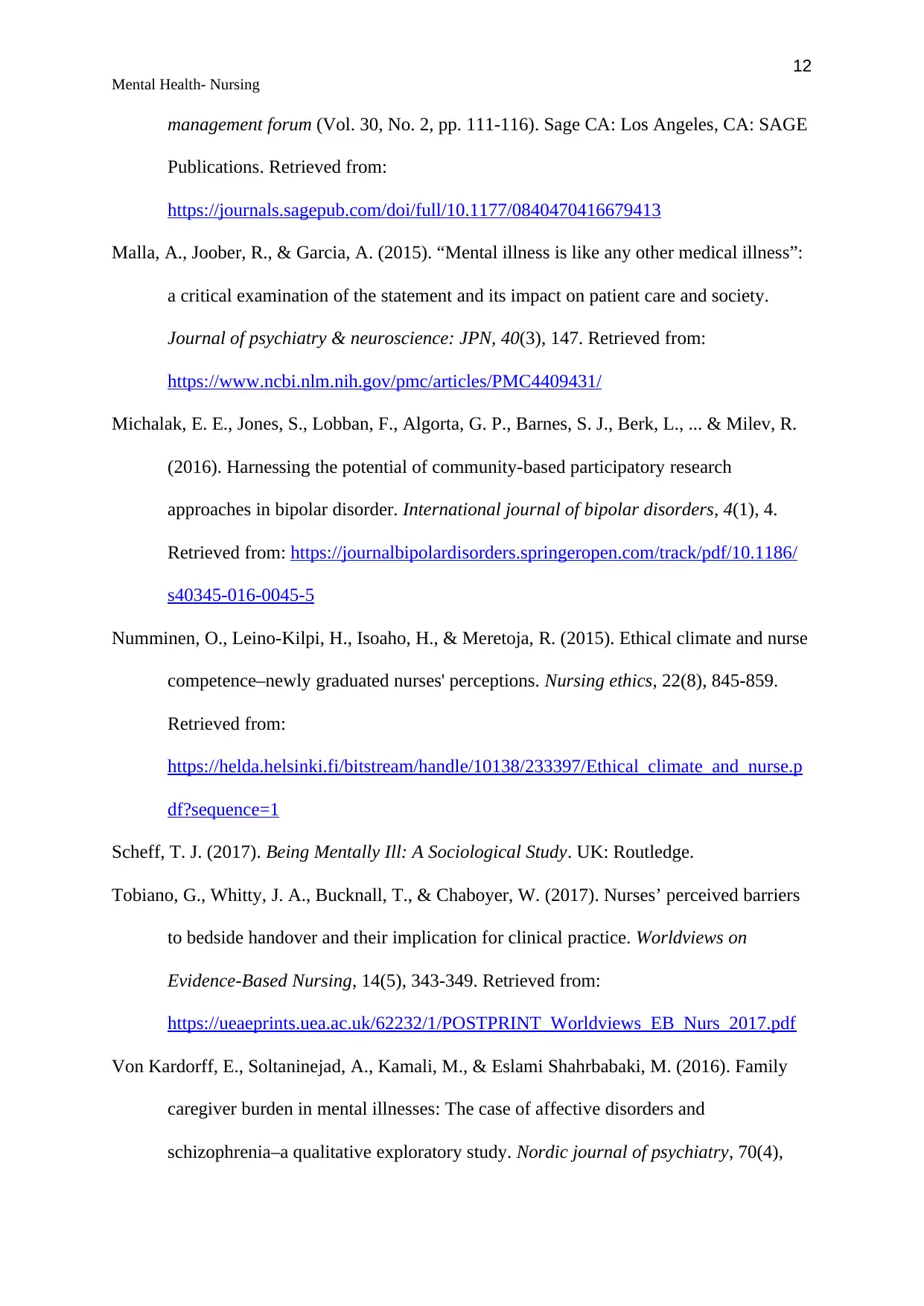
12
Mental Health- Nursing
management forum (Vol. 30, No. 2, pp. 111-116). Sage CA: Los Angeles, CA: SAGE
Publications. Retrieved from:
https://journals.sagepub.com/doi/full/10.1177/0840470416679413
Malla, A., Joober, R., & Garcia, A. (2015). “Mental illness is like any other medical illness”:
a critical examination of the statement and its impact on patient care and society.
Journal of psychiatry & neuroscience: JPN, 40(3), 147. Retrieved from:
https://www.ncbi.nlm.nih.gov/pmc/articles/PMC4409431/
Michalak, E. E., Jones, S., Lobban, F., Algorta, G. P., Barnes, S. J., Berk, L., ... & Milev, R.
(2016). Harnessing the potential of community-based participatory research
approaches in bipolar disorder. International journal of bipolar disorders, 4(1), 4.
Retrieved from: https://journalbipolardisorders.springeropen.com/track/pdf/10.1186/
s40345-016-0045-5
Numminen, O., Leino-Kilpi, H., Isoaho, H., & Meretoja, R. (2015). Ethical climate and nurse
competence–newly graduated nurses' perceptions. Nursing ethics, 22(8), 845-859.
Retrieved from:
https://helda.helsinki.fi/bitstream/handle/10138/233397/Ethical_climate_and_nurse.p
df?sequence=1
Scheff, T. J. (2017). Being Mentally Ill: A Sociological Study. UK: Routledge.
Tobiano, G., Whitty, J. A., Bucknall, T., & Chaboyer, W. (2017). Nurses’ perceived barriers
to bedside handover and their implication for clinical practice. Worldviews on
Evidence‐Based Nursing, 14(5), 343-349. Retrieved from:
https://ueaeprints.uea.ac.uk/62232/1/POSTPRINT_Worldviews_EB_Nurs_2017.pdf
Von Kardorff, E., Soltaninejad, A., Kamali, M., & Eslami Shahrbabaki, M. (2016). Family
caregiver burden in mental illnesses: The case of affective disorders and
schizophrenia–a qualitative exploratory study. Nordic journal of psychiatry, 70(4),
Mental Health- Nursing
management forum (Vol. 30, No. 2, pp. 111-116). Sage CA: Los Angeles, CA: SAGE
Publications. Retrieved from:
https://journals.sagepub.com/doi/full/10.1177/0840470416679413
Malla, A., Joober, R., & Garcia, A. (2015). “Mental illness is like any other medical illness”:
a critical examination of the statement and its impact on patient care and society.
Journal of psychiatry & neuroscience: JPN, 40(3), 147. Retrieved from:
https://www.ncbi.nlm.nih.gov/pmc/articles/PMC4409431/
Michalak, E. E., Jones, S., Lobban, F., Algorta, G. P., Barnes, S. J., Berk, L., ... & Milev, R.
(2016). Harnessing the potential of community-based participatory research
approaches in bipolar disorder. International journal of bipolar disorders, 4(1), 4.
Retrieved from: https://journalbipolardisorders.springeropen.com/track/pdf/10.1186/
s40345-016-0045-5
Numminen, O., Leino-Kilpi, H., Isoaho, H., & Meretoja, R. (2015). Ethical climate and nurse
competence–newly graduated nurses' perceptions. Nursing ethics, 22(8), 845-859.
Retrieved from:
https://helda.helsinki.fi/bitstream/handle/10138/233397/Ethical_climate_and_nurse.p
df?sequence=1
Scheff, T. J. (2017). Being Mentally Ill: A Sociological Study. UK: Routledge.
Tobiano, G., Whitty, J. A., Bucknall, T., & Chaboyer, W. (2017). Nurses’ perceived barriers
to bedside handover and their implication for clinical practice. Worldviews on
Evidence‐Based Nursing, 14(5), 343-349. Retrieved from:
https://ueaeprints.uea.ac.uk/62232/1/POSTPRINT_Worldviews_EB_Nurs_2017.pdf
Von Kardorff, E., Soltaninejad, A., Kamali, M., & Eslami Shahrbabaki, M. (2016). Family
caregiver burden in mental illnesses: The case of affective disorders and
schizophrenia–a qualitative exploratory study. Nordic journal of psychiatry, 70(4),

13
Mental Health- Nursing
248-254. Retrieved from:
https://www.researchgate.net/profile/Ali_Soltaninejad2/publication/
283455931_Family_caregiver_burden_in_mental_illnesses_The_case_of_affective_di
sorders_and_schizophrenia_-_a_qualitative_exploratory_study/links/
5809e7ad08ae45e02c0d5d13.pdf
Mental Health- Nursing
248-254. Retrieved from:
https://www.researchgate.net/profile/Ali_Soltaninejad2/publication/
283455931_Family_caregiver_burden_in_mental_illnesses_The_case_of_affective_di
sorders_and_schizophrenia_-_a_qualitative_exploratory_study/links/
5809e7ad08ae45e02c0d5d13.pdf
1 out of 13
Related Documents
Your All-in-One AI-Powered Toolkit for Academic Success.
+13062052269
info@desklib.com
Available 24*7 on WhatsApp / Email
![[object Object]](/_next/static/media/star-bottom.7253800d.svg)
Unlock your academic potential
© 2024 | Zucol Services PVT LTD | All rights reserved.





